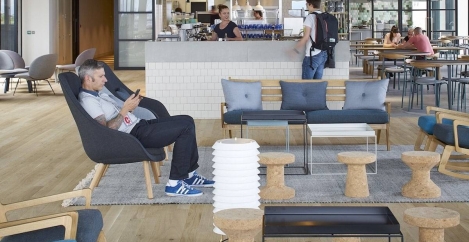June 6, 2019
Flexible working may not enhance productivity
 The majority of office employees (84 percent) believe good relationships with colleagues boost their quality of work, yet nearly three quarters (70 percent) admit to not knowing the people they work with very well, claims a new survey from Nespresso Professional. The study suggests that changing office environments and flexible working practices are not improving employees’ relationships with co-workers, or their creativity and output.
The majority of office employees (84 percent) believe good relationships with colleagues boost their quality of work, yet nearly three quarters (70 percent) admit to not knowing the people they work with very well, claims a new survey from Nespresso Professional. The study suggests that changing office environments and flexible working practices are not improving employees’ relationships with co-workers, or their creativity and output.
Many companies are using contemporary technologies, office layout and flexible working as tools for recruitment and retention, yet hot-desking, does not seem to be entirely effective, with two-thirds (63 percent) of those who do it saying they come in early to secure their favourite workspace.
[perfectpullquote align=”right” bordertop=”false” cite=”” link=”” color=”” class=”” size=””]“ Flexible working is increasingly commonplace, our findings indicate a tangible threat to both satisfaction and productivity levels.”[/perfectpullquote]
Despite more companies encouraging remote and other forms of flexible working, the majority (82 percent) of those surveyed agreed face-to-face interactions are critical to developing good working relationships. But almost half (47 percent) said employers did not encourage them to get to know their colleagues other than in the basic work sense. And 48 percent complained that new technology was getting in the way of getting to know their colleagues properly.
“At a time when technology is transforming the way we interact with our colleagues, and flexible working is increasingly commonplace, our findings indicate a tangible threat to both satisfaction and productivity levels. This puts the pressure on employers to create and promote opportunities for collaborative interactions in today’s less structured office environments,” said Francisco Nogueira Head of Out-of-Home at Nespresso.
The ups and downs of flexible working
The research points to flexible working being a reality for less than half of offices. The majority of respondents (61 percent) said that their workplace does not yet offer the flexibility to choose their hours or work from home, whilst 40 percent said they did.
Interestingly, when working remotely, people do not seem to miss the company of colleagues, with only 18 percent saying they get lonely working from home. Numbers were slightly higher for younger respondents (26 percent of those aged 18-24 compared to 10 percent of those over 55).
Almost half (48 percent) of those surveyed agreed that the increasing ubiquity of new technologies, including video conferencing and collaboration tools, means they get to know their colleagues less personally. Meanwhile, face-to-face interactions are definitely considered important, the largest proportion of respondents (34 percent) said that 3 to 5 meetings are the optimum to bring a new idea into effect.
Rachel Lewis, associate professor in occupational and business psychology, Kingston University: “Communications technology has been shown to increase the risk of miscommunication – meaning it may not only slow the growth of relationships, but also harm them, leading to social isolation and loneliness for some”.
While opinions may be divided on the design and culture of modern workplaces, it is clear that getting the balance right is critical to employee wellbeing, the report concludes. As many as 95 percent of respondents said that the quality of the workspace is important to their mental health. This implies that employers seeking to create workspaces that inspire both productivity and collaboration should work proactively with their staff to ensure any solutions are designed to nurture meaningful relationships, in spite of evolving working practices.













